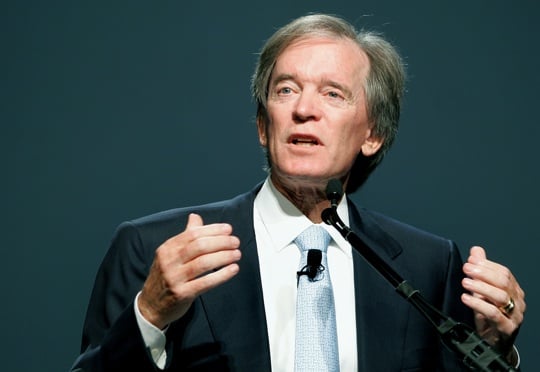With big investments in emerging markets and convertible securities, Loomis Sayles' Bond Fund is yards ahead of Pimco's Total Return Fund in 2010. But don't worry about Bill Gross -- he's still having a pretty good year.
Loomis Sayles & Co. has fled Treasuries and bought Canadian and Indonesian debt, beating out 95 percent of fixed-income funds this year.
The $19.5 billion Loomis Bond Fund returned 12.2 percent as the Boston-based firm shifted money into Canadian government securities, emerging markets and convertible and junk bonds, according to data compiled by Bloomberg. Pacific Investment Management Co.'s Total Return Fund, the world's largest bond mutual fund, gained 7.99 percent.
Loomis hasn't owned Treasuries for more than a year and is betting emerging-market currencies including Indonesia's rupiah will appreciate against the dollar, money manager Kathleen Gaffney said in a telephone interview. The Federal Reserve affirmed on Dec. 14 its plan to buy as much as $600 billion of Treasuries to stimulate the economy in the latest stage of a process known as quantitative easing, or QE2. That may weaken the U.S. currency, Gaffney said.
“We're going to see the developing world lead the global recovery,” said Gaffney, who has worked at Loomis for 26 years and helps oversee the firm's $150 billion in assets. “The developed world is getting on that QE2 bandwagon, letting your currency devalue.”
The Bloomberg-JPMorgan Chase & Co. Asia-Dollar Index, which tracks the performance of Asia's 10 most-active currencies against the U.S., has risen to 114.5 this year from 110.7 on Dec. 31. The rupiah climbed to 9,043 to the dollar from 9,404 at the end of 2009.
Treasuries Lose
Treasuries have lost 2.09 percent in December, the worst monthly performance in a year, Bank of America Merrill Lynch index data show. The U.S. government has issued $2.15 trillion of notes and bonds in 2010, topping last year's record of $2.109 trillion.
“There's going to be a ton of supply,” said Elaine Stokes, who also helps manage the Loomis Bond Fund along with Dan Fuss and Matthew Eagan. “Whenever there's an artificial buyer in the market, we have to be a little bit worried.”
Elsewhere in credit markets, the extra yield investors demand to own company bonds worldwide instead of similar- maturity government debt was unchanged at 170 basis points, or 1.7 percentage points, according to Bank of America Merrill Lynch's Global Broad Market Corporate Index. Yields averaged 3.94 percent.
Bonds from Charlotte, North Carolina-based Bank of America Corp. were the most actively traded U.S. corporate securities by dealers, with 84 trades of $1 million or more, according to Trace, the bond-price reporting system of the Financial Industry Regulatory Authority.
The Loomis Bond Fund holds Indonesian 10 percent government bonds denominated in rupiah due in September 2024, Bloomberg data show. The government's rupiah debt has returned an average of 25 percent in dollar terms this year, according to JPMorgan index data.
Bush Tax Cuts
A U.S. extension of Bush-era tax cuts may add a 1 percentage point increase to the nation's GDP, Michael Cloherty, head of U.S. rates strategy of RBC Capital Markets LLC, wrote Dec. 9 in a research report.
“It's not good for the Treasury market,” Gaffney said. “We don't think rates are going to start rising for at least a year, but sometime over the next year or two.”
Loomis has shortened the average duration of its flagship bond fund to about 5.9 years from 6.5 years at the end of 2008 to guard against rising interest rates, Gaffney said.
The benchmark Treasury yields 3.34 percent and is forecast to yield 3.55 percent by the fourth-quarter of 2011, according to the median estimate of economists surveyed by Bloomberg.
Loomis favors Canadian government bonds instead of Treasuries in part because the country has less debt relative to the size of its economy than the U.S. Canada's budget deficit for fiscal year 2010 equaled 3.6 percent of its GDP, compared with an estimated 8.9 percent for the U.S.
Canada is also better positioned to benefit from emerging market demand for commodities, Gaffney said. Commodities account for about half of Canada's export revenue.
Demand for Commodities
“Our developed world positions, and the commodity currencies, Canada, Australia, New Zealand, are also beneficiaries of emerging market demand,” Gaffney said.
Companies worldwide have issued $3.15 trillion in bonds this year compared with almost $3.88 trillion in 2009, Bloomberg data show. Investment-grade corporate bonds have lost 1.61 percent in December, poised for their worst monthly performance since October 2008, according to Bank of America Merrill Lynch index data.
“We have pared down the investment-grade corporates,” Gaffney said. “That's the area where we've seen the biggest tightening in spreads, leaving them much more sensitive to interest rate changes.”
While Loomis has sought junk bonds that offer a cushion from rising interest rates, the firm is wary of taking too much credit risk, Gaffney said.
Convertible debt, which can be swapped for equity shares, has returned 15.14 percent in 2010, Bank of America Merrill Lynch index data show. Pimco, based in Newport Beach, California, last week said it's expanding its policy to allow investments in equity-linked securities for the first time since 2003.
“Rather than going too far down in quality, we're saying we'll take some equity risk,” Gaffney said.







